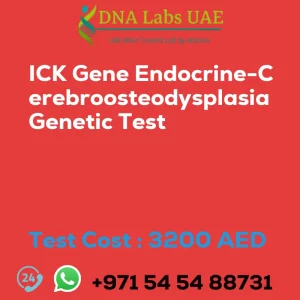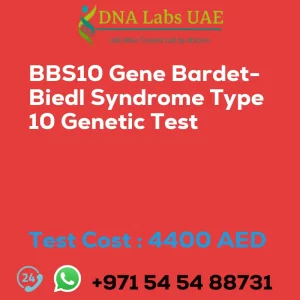F13A1 Gene Factor XIIIA deficiency Genetic Test
At DNA Labs UAE, we offer the F13A1 Gene Factor XIIIA deficiency Genetic Test at a cost of AED 4400.0. This test is used to diagnose and determine the severity of Factor XIIIA deficiency, a condition that can lead to impaired blood clot formation and an increased risk of bleeding.
Test Details
The F13A1 gene encodes the Factor XIII A subunit, which is a component of the blood clotting system. NGS (Next-Generation Sequencing) genetic testing is used to analyze the DNA sequence of the F13A1 gene. This allows for a comprehensive analysis of any mutations or variations that may be associated with Factor XIIIA deficiency.
Components
- Test Name: F13A1 Gene Factor XIIIA deficiency Genetic Test
- Price: AED 4400.0
- Sample Condition: Blood or Extracted DNA or One drop Blood on FTA Card
- Report Delivery: 3 to 4 Weeks
- Method: NGS Technology
- Test Type: Hepatology Nephrology Endocrinology Disorders
- Doctor: General Physician
- Test Department: Genetics
Pre Test Information
Prior to the F13A1 Gene Factor XIIIA deficiency Genetic Test, it is important to provide the clinical history of the patient. Additionally, a genetic counseling session may be conducted to draw a pedigree chart of family members affected by Factor XIIIA deficiency. This will help in understanding the inheritance pattern and identifying potential carriers of the gene.
Benefits of NGS Genetic Testing
NGS genetic testing allows for a comprehensive analysis of the F13A1 gene, helping in diagnosing Factor XIIIA deficiency, determining its severity, and guiding treatment decisions. It can also be used for carrier testing in individuals with a family history of Factor XIIIA deficiency.
Qualified Healthcare Professionals
It is important to note that genetic testing should be performed and interpreted by qualified healthcare professionals who specialize in genetic testing and counseling. They can provide accurate information about the implications of the test results and guide appropriate management strategies.
Choose DNA Labs UAE for reliable and accurate genetic testing. Contact us today to schedule your F13A1 Gene Factor XIIIA deficiency Genetic Test.
| Test Name | F13A1 Gene Factor XIIIA deficiency Genetic Test |
|---|---|
| Components | |
| Price | 4400.0 AED |
| Sample Condition | Blood or Extracted DNA or One drop Blood on FTA Card |
| Report Delivery | 3 to 4 Weeks |
| Method | NGS Technology |
| Test type | Hepatology Nephrology Endocrinology Disorders |
| Doctor | General Physician |
| Test Department: | Genetics |
| Pre Test Information | Clinical History of Patient who is going for F13A1 Gene Factor XIIIA deficiency NGS Genetic DNA Test. A Genetic Counselling session to draw a pedigree chart of family members affected with F13A1 Gene Factor XIIIA deficiency NGS Genetic DNA Test gene F13A1 |
| Test Details |
The F13A1 gene encodes the Factor XIII A subunit, which is a component of the blood clotting system. Deficiency in Factor XIIIA can lead to impaired blood clot formation and an increased risk of bleeding. NGS (Next-Generation Sequencing) genetic testing is a method used to analyze the DNA sequence of genes. In the context of F13A1 gene Factor XIIIA deficiency, NGS genetic testing can be used to identify any mutations or variations in the F13A1 gene that may be associated with the deficiency. NGS genetic testing involves sequencing the entire F13A1 gene or specific regions of interest within the gene. This allows for a comprehensive analysis of the genetic variations that may be contributing to Factor XIIIA deficiency. By identifying specific mutations or variations in the F13A1 gene, NGS genetic testing can help in diagnosing Factor XIIIA deficiency, determining the severity of the deficiency, and guiding treatment decisions. It can also be used for carrier testing in individuals with a family history of Factor XIIIA deficiency. It is important to note that genetic testing should be performed and interpreted by qualified healthcare professionals who specialize in genetic testing and counseling. They can provide accurate information about the implications of the test results and guide appropriate management strategies. |








